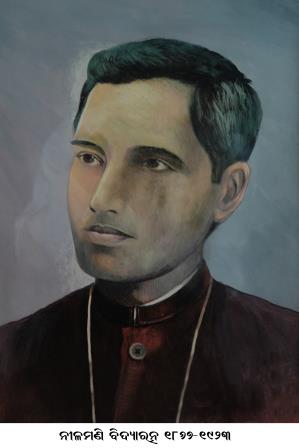Pandit Nilamani Bidyaratna
Died :- 26-Jul-1924
Place of Birth :- Baideshwara, Banki, Cuttack

Pandit Nilamani Bidyaratna is a sacred name always remembered by every odia with love respect and honour. The phase of Odisha’s History that saw conspiracies to abolish Odia and impose Hindi in the west, Telugu in the south and Bengali in the coastal areas of the province, the fight to thwart the ill-intentioned attempt and restore the dignity of Odia language and culture, and the unification of Odia-speaking tracts into a separate province throws up names of many stalwarts among whom Bidyaratna was the most prominent. His role in shaping the destiny of modern Odisha was very significant.
Nilamani was born on14 December, 1867 in Baideswar near Banki in Cuttack district. Poverty forced him to give up studies after Class VII, but his thirst for knowledge saw him emerge as a scholar in Sanskrit and Odia literature.
At the age of 20, he took over as editor of the literary magazine, Sambalpur Hitaishini, published by the Raja of Bamanda, Sir Basudev Sudhal Dev. It promoted the cause of Odia literature and nurtured a generation of Odia writers while leading a campaign to promote Odia nationalism.
Sambalpur was then a part of Madhya Pradesh (Central Provinces) and Hindi was made its official language owing to a conspiracy by. In 1903, the government finally decided to replace Hindi with Odia as the official language, owing to a relentless campaign by Nilamani in Sambalpur Hitaishini.
He was bestowed the prestigious title of ‘Bidya Ratna’ by the king and the learned queen of Badamba for his wisdom and his multifarious activities to promote literature, culture and and bring reforms in the society. He wa also made an honorary member of the State Council of the kingdom of Badamba.
In 1902, he moved to Ganjam and took over as editor of ‘Prajabandhu’, a magazine published by the Raja of Khalikote, Harihar Mardaraj.
Nilamani advocated the unification of Odia speaking tracts in Madhya Pradesh, Madras and Bengal and while in Khalikote, he, with the support of the Raja organised ‘Utkal Sabha’ (later known as Madras Odia Association) to which he invited two great Odia nationalists, Madhusudan Das and Biswanath Kar. This conference laid the foundation of Utkal Sammilani set up by Madhubabu, which spearheaded the movement for the unification of the Odia-speaking tracts into a separate province.
After leaving Khallikote, he edited ‘Guna Darpan’, which was published by the Raja of Badakhemandi, Anangabhima Dev. He also brought out a monthly magazine called ‘Utkal Madhupa’, in which one could see the beginning of the effort which culminated in the compilation of encyclopaedias in Odia in later years.
He was also the editor of the prestigious Odia weekly, ‘Utkala Dipika’, but gave up this job following difference of opinion with the other members of its Board of Directors.
Nilamani Bidyaratna was not only a fearless journalist and a nationalist but also a social reformer advocating widow marriage and abolition of child marriage, dowry system and caste system, and had authored books and booklets for the common men to raise their level of consciousness about the prevalent superstitions and social evils. Establishment of a widow shelter at Puri had earned him rivalry of the conservative Brahmins and there were attempts to eliminate him. But despite all threats he carried out his mission with courage and determination.
He was almost a pauper during the last stage of his life while living in Cuttack due to severe illness he breathed his last on 26 July, 1923.
Books
Poem
Hymn
Science Literature
Story
Short Story
Eassays
Copyright © 2024 Odia Virtual Academy. All rights reserved Total Visitors- 1
Powered by: Odia Virtual Academy

